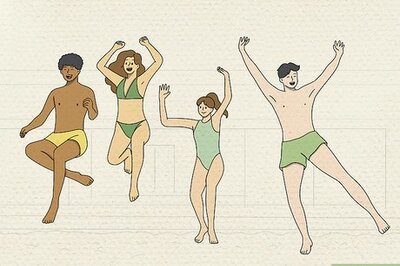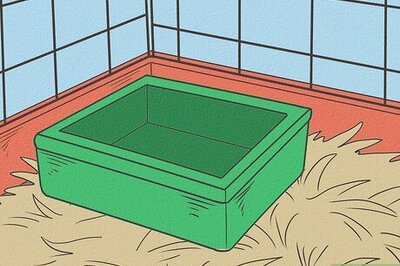
views
In Mulegaon waadi in Nasik’s Tryambak district, eight-year-old Anjana Dattu Sarai is oblivious to her bleeding toe. She rushes to the neighbourhood well with her friends. She has one pot on her head and another on her waist. She runs barefoot through the barren fields in the scorching sun. This is her sixth trip to the well since morning. She is accompanied by her four-year-old sister.
In Maharashtra, which witnesses its worst drought since 1972, this picture isn’t unusual. But the narratives of women, who have to single-handedly bear the load of fetching water for all the family requirements, are an eye-opener.
In the western state, drought has been declared in 151 of the 358 talukas. It means that 18,271 of the 43,665 villages are parched and thirsty. With an allocation of over Rs 7,700 crore from the Centre as well as the state, the government has announced a slew of measures to deal with the situation. Delayed monsoon has hit some parts of the state now, though.
Tales of these women are hidden under the wraps of social shame. In several villages, women refuse to open up unless they are prodded, and are in the safety of groups. Their stories let us peep into the dark world of domestic abuse, of lost childhoods, of removed uteruses, of miscarriages, of higher cancer risks, and of cervical spondylitis. All because they have had to go through the drudgery of fetching water for the families for years on end.
Though there is no study to measure the impact of drought on women and girl children’s health, medical practitioners and government officials working in rural and tribal areas talk of chronic physical and mental health issues faced by women.
From menstrual hygiene to reproductive health, from depression to lack of confidence, the layers of the stories get darker as we peel further. And yet, not many seemed to know why men do not pitch in to help. Each and every person who was asked a simple question, “Do you help get water?” or “Does your husband help you fetch water?” initially reacted with shock, and then brushed it aside as if the work did not come under men’s domain.
“They say, it is not their job. They say, taking care of the house is your job. So you need to fetch water,” said Yamuna Namdev Pardhi from Mulegaon waadi in Tryambak taluka of Nasik.
“There is only one true God, the Patidev. The rest are all false. He will go out, have fun with friends, then return home and sit at one place. He demands that things be served to him. Water, food, everything has to be served to him. And if you don’t, you will get to know how the wood of our village jungle speaks to you,” smiled Mangal Cholke in Nasik’s Nandgaon district’s Morzar village.
Her sarcasm about domestic violence draws bursts of laughter from the other women. They open up as they sit under the shade of a huge, old dried tamarind tree, waiting for their turn at the hand-pump. The hand-pump was their only source of potable water for over eight years till recently. To fill a pot of five litres’ water, each woman had to pump for over two and a half hours. The rigour made them breathless.
“I feel like my lungs will come out. I can’t breathe. I feel choked,” said Sangeeta Nikole, who looked much older than her real age. At 35, she is a mother of three children, including two adolescent daughters. But she feels she is luckier than her friend Kavita Vilas Cholke, who is suffering from such severe spondylitis that she can barely walk or sit up.
At 35, Kavita has been advised a spinal surgery by the doctor. “Even that is risky, they say. But that is my only chance. I can’t sit for long. I can’t walk. I can’t carry any weight. But how will I bring the thousands of rupees required for the surgery? I am a single mother,” she said.
Her old mother and mother-in-law help fetch water, now that she can’t do it. She was widowed within a few years of getting married. Her husband fell off a running train and died, leaving the responsibility of the household and their baby to her. Since that time, she said, she has never rested.
Living opposite her is Ujjwala Cholke. She has had two miscarriages because of fetching water. She could conceive only after she underwent a minor surgical procedure and went away to her parents’ place. “I have terrible shoulder pain, neck pain. My back hurts. During periods, my stomach hurts a lot. But who do I complain to? There is no doctor in the village. I once went to a doctor in Nasik. I was told, I should use clean water during periods. But there is no water at all. What do I do? Now, my small children also have to fetch water with me. I have to manage everything single-handedly as my mother-in-law is old. I feel worn out,” she said.
The dry wells, dried up riverbeds tell the story of a great human cost. Often, the cost women have to pay in terms of mental and physical health.
For 65-year-old Rambai Cholke, lack of water has been a lifelong problem. “Since the time I got married, I had to fetch water. Then, after my two kids, the doctor said that the pain I face is because of the protrusion of the uterus. Thus, I got operated on.
After the removal of the uterus, I face other problems. My chest pains. It feels like my lungs will come out. My back hurts a lot. But I still go out to fetch water. My son has recently got married. And I don’t want my young daughter-in-law to face this so soon,” she said. Rambai’s son’s is a rare example in a village where young men don’t get married due to water scarcity.
“Nobody wants to send their daughters to our village, as we don’t have water. But what can we do about it? It only means we will have to keep doing this till we die. Madam, you open your fitness centre in our village. Get all the obese women from the city here. It is a guaranteed weight loss program. You will profit a lot,” joked Sangeeta Nikole.
Her two teenaged daughters sit at another friend’s home. The girls mumble among themselves, and giggle when asked anything. “They won’t talk to outsiders. They are still quite shy,” said an elderly woman.
As I tried to discuss with the girls about the difficulties they faced during menstruation, all my efforts were thwarted by them. Slowly, the elderly women of the village gathered in the room. “There are lot of problems during periods, madam. Forget periods, even for relieving ourselves, we have to wait till night, or have to go out before the break of the dawn. There is no water. How do we use toilets? During periods, almost all of these girls have severe cramps in their stomachs. But what can be done?” asked a woman. When asked if they got sufficient water to maintain menstrual hygiene, everyone shut down like I had talked about a taboo.
A girl carrying a vessel of water in drought-hit Maharashtra village
Govt Aware of the Issues
Bhagyashri Bairagi, an employee of Nasik Zilla Parishad’s water resources department, works on the issues of menstrual health in tribal areas. She said, the impact of drought on the physical and mental well-being of adolescent girls was considerable.
“In the tribal and rural areas, women use leaves, jute from old door mats, during their periods. Because there is no water. So they shouldn’t have to wash clothes. They just throw these things away after using them. There is no awareness among people. They think, water is only for drinking and bathing. They use the same piece of cloth for days. They have itching. There is bleeding from their thighs, there is vaginal infection. That is why the proportion of cramps, stomach aches is rising in the rural and tribal areas. There is drought in Maharashtra now. Women know there is no drinking water. So how can they maintain menstrual hygiene? So women avoid it. If they suffer due to pain, they don't even talk about it. They suffer in silence. And that affects their mental health as well. They suffer physically and mentally. Their reproductive health takes a hit.”
She said that during her field visits in the tribal areas, she found that women didn’t even have clean cloth to wipe themselves off after delivery too. “Girls don't use cloth. In the hostel schools, if their uniforms get stained, they don't even get water to wash it. They sit in the school with the same stains. Often, then, they drop out. Or they feel a sense of suffocation. That leads to mental health issues like depression, self-doubt and lack of confidence. They can’t even talk about it because of the taboo attached to it,” Bairagi said.
Indumati Gode, an Aanganvadi sevika at Wadoli village, said that her 20-year service corroborated the observation that the burden of fetching water lies with women alone. “Many times, the woman has to go out to fetch water within four-five days of her delivery. Nobody else goes,” she said.
In the tribal village of Mulegaon waadi, the burden of farming, cooking, fetching firewood and water lies solely on the shoulders of 23-year-old Sangita Lalu Ramse. In many villages, it is more of a rule than an exception.
Medical Observations
Dr Dhruv Mankad, who has been working in tribal and rural areas of Maharashtra for over three decades, said the cost of drought on women’s health has been substantial. “Often, from the age of four, they have to start fetching water, walk long distances with weight on their heads. This causes chronic spinal cord problems,” he said. Another issue of concern is the high proportion of low birth weight in drought-prone areas.
“In developing countries, we expect there will be 20-30 per cent low birth weight. This proportion is already high. But we have observed that in parts where there is water shortage, the proportion is much higher. Even up to about 40 to 50 per cent. It is a mixed bag. Nutrition, early marriages are factors. Lack of water is a burden that adds on,” he said.
“The factor is that there isn't enough quantity of water, water distribution system is not adequate. We have seen cases after cases. Someone has suffered with dehydration, not necessarily during summers. Backaches, spondylitis are major problems because they have to bring lot of water on the head. And this starts from childhood. This is a chronic problem. For the adult mothers, for 25 or 30 years old mothers, by the time their uterus prolapses. Apart from the normal life, this can also become a cause of cancer in the future age, as the ulcers come out. So there is a challenge in this. Highly unhygienic water during periods can lead to infections, both in UTI, kidneys are affected. That is a cause of maternal deaths if it is too chronic. The other part is vaginal infection. That has effects on the fertility, and can cause cancer in the later stages. These are huge challenges,” he added.
What Do Men Feel?
And why is it that men don’t help? At Lasalgaon, Bhaskar Patil, Director of the Agricultural Produce Market Committee, is one of the few men who open up. “In rural areas, the things that our women suffer, no other woman anywhere in the world has to go through. For 24 hours, she has to take care of the house. The household needs water, so she needs to fetch it. There have been many instances when women have died due to heat,” he said.
“But why don’t men help, if the women of their households suffer so much?” I interrupted him. “Very few men, who are educated, and who know the hardships of the women, support women. But they are very few. Boys who go to colleges feel ashamed to help. Actually, men feel so ashamed that they cannot see the hardships of the women. That is why they hide their faces and go away. This situation is terrible. Maximum trouble is for the woman,” he said.
A group of women interacting with CNN-News18 and sharing their ordeal
Nearly 90 kilometres away, at Mulegaon wadi, the men of the village gambled, sitting under a tree, while the women of the village did their rounds to the well. “What are you doing?” I asked 38-year-old tribal farmer Dilip Ramse. “We are doing time pass. We are gambling. There is no work right now. Work begins only after rains,” he replied. When I asked him why he didn’t help the women of the house and his small daughter in fetching water, he said, “Men don't do it much. Women only do it. Men do farming. Women undergo lot of sufferings. They have to cook, fetch water. Most of the work is done by women. They do farming too. Water problem is permanent here. Only during rains, there is water. Otherwise, the women have to walk till the well every day.”

















Comments
0 comment